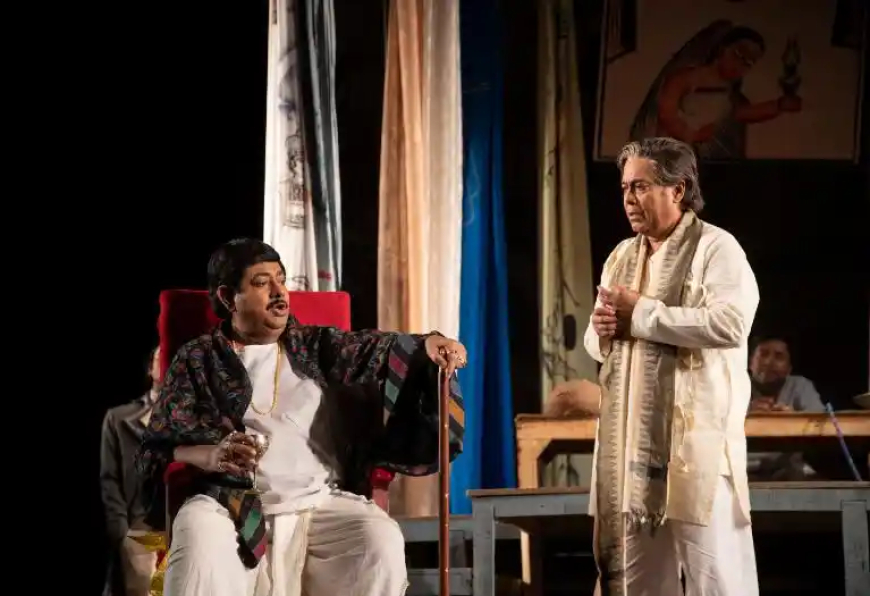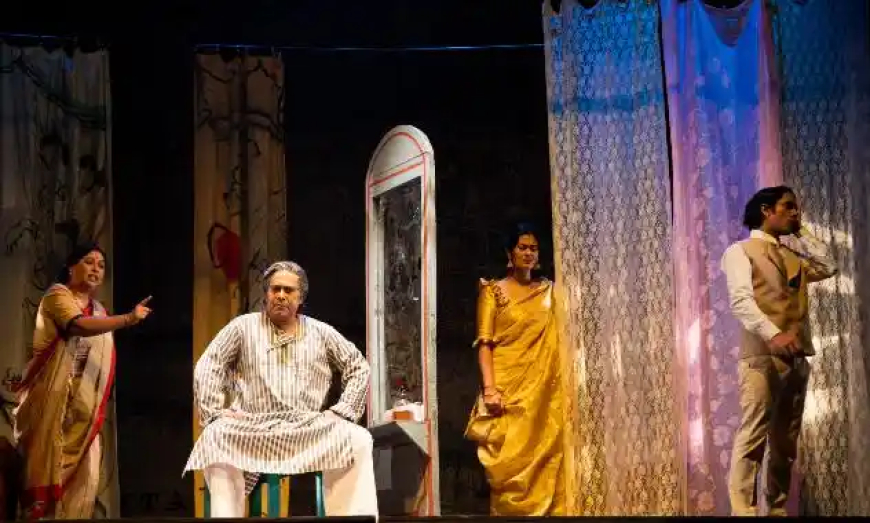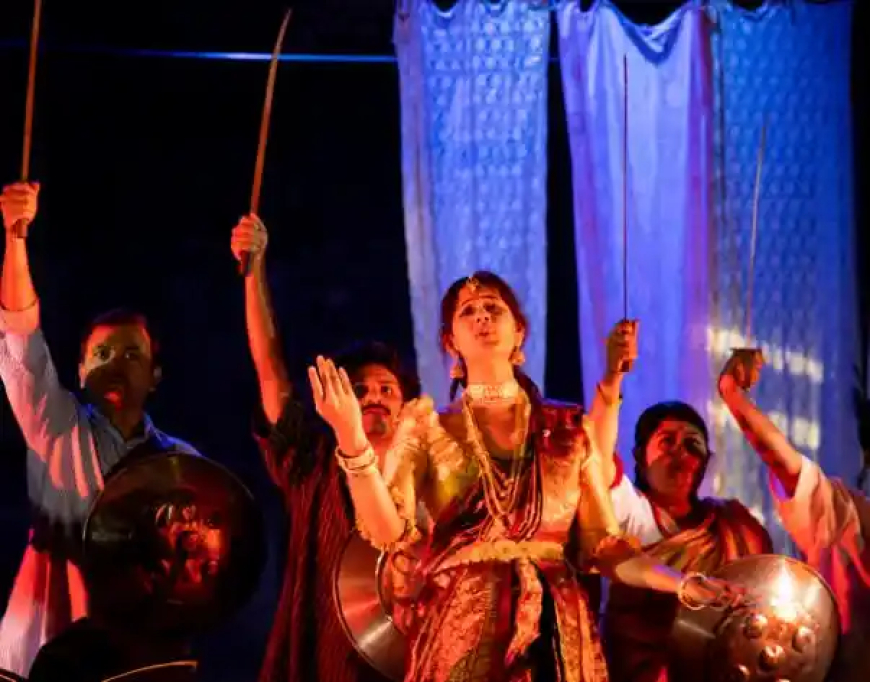Suman Muhopadhyay's Tiner Talowar : Recreating History of Utpal Dutt
Dr. Shoma A. Chatterji provides an in-depth review of TINER TALOWAR originally written, acted and directed by UTPAL DUTT in the early 1970s now recreated by SUMON MUKHOPADHYAY 50 years after Dutt staged it.

Can a sword made of a flexible and soft metal like tin have the sharpness and the cutting edge of a real sword? It can, going by the play written, acted in and directed by Utpal Dutt himself and staged for the first time in the early 1970s. Like Augusto Boal (the Latin American theatre personality who wrote Theatre of the Oppressed), Dutt felt that all theatre is political. He stressed that theatre could never be meaningful if it does not consider the political ethos within which it has to negotiate the terms of the volatile and fluctuating relationships between and among human beings. Among his strongly political plays, one must count Tiner Talowar.
To resurrect, re-structure and perform a fifty-three-year-old play is almost impossible. The time-lapse, the political and historical changes over time needed to be brought in. The ‘period’ element in the very form of the performance that was popular then, had to remain unchanged to sustain the flavor of the period and yet bring about a performance the contemporary audience will be able to comprehend, appreciate and question. But Suman Mukhopadhyay, a veteran in theatre himself now, decided to recreate this play Tiner Talowar authored by Utpal Dutt himself!
Tiner Talowar is literally translated as “The Tin Sword”, a contradiction in terms as a sword cannot be crafted out of tin which is malleable, fragile and soft, in short, unable to bear the rigours or the violence of warfare. The play is alternately called “The Sword Unsheathed.” The reality lies in how a marginalized, impoverished group of theatre actors and workers use this sword metaphorically and performatively, as a sharp expression of rebellion against the then-British Government intent on censoring any performance that even hinted at the dictatorial and undemocratic weapon of suppression and arrest by the British as ‘punishment.’

Today, the Suman Mukhopadhyay-directed 2023-24 version shows that though the British have left Indian shores in 1947, we remain under a different kind of suppression of our freedom of expression which is our constitutional right. Says Mukhopadhyay, “In the play, Utpal Dutt paid tribute to the theatre artistes of the 19th century. The tumultuous times of the 19th century form the backdrop of this play. Bengali society has reached the nadir of cultural degeneration. The play takes an anti-establishment stance when today, we have reached at a shocking and disconcerting juncture in Indian history in today’s context.” In other words, Utpal Dutt’s play has not lost its contemporary relevance.
Suman Mokhopadhyay has remained loyal to the original Utpal Dutt play. Except that he has inserted certain contemporary political realities that imposed on the common man’s right to freedom of expression such as the declaration of the Emergency in 1975. Thus, like its original writer, actor and director, Mukhopadhyay has sustained Dutt’s Tiner Talowar’s unique feature of being both contemporary and classic. Tiner Talowar (1973) was built on the historical model inaugurated by Girish Ghosh to demonstrate how the play is an allegory of the way in which bourgeois resistance ultimately disavows its professed revolutionary stance.
This critic is one among few who has had the good fortune to watch the performance of the original Utpal Dutt play more than five decades ago and this recreated version. Suman has kept the original intact but has incorporated contemporary political realities. For example, the performance of this revived play interestingly coincides with the inauguration of the Ram Mandir, underlining the dominance of the Hindu Right in the country. This, on close examination, is hardly different from the severe censorship by the then-British Government the original play is set against, which banned theatrical performances that questioned the British rule even passively and placed theatre personalities behind bars, banning the performance of such plays.

The mood of the play strikes one the minute the curtains go up with the rich background score and songs by National Award-winning music director Prabuddha Banerjee who beautifully reconstructs the old school theatre or jatra form of theatre-in-the-round music, live, during the performance. Classic songs composed by Jyotirindranath Thakur, Michael Madhusudan Dutta, Kaliprasanna Singha and Amar Dutta have been used to sustain the period flavor. Benimadhab Chatterjee, (Debshankar Haldar) who refers to himself as the Garrick of Kolkata, (Garrick was a famous British-Canadian actor-director), also addressed as Kaptan Babu who heads Bengal Opera is supervising the posters of the latest play as he downs a drink and then falls in a long, drunken, sleep. His entire troupe is not inclined to stage Mayurbahon but Benimadhab is hesitant to switch over to the staging of Tiner Talowar because the group is going through very lean days and he is afraid of the repercussions from the British rulers and the owner, the womanizing, forever drinking, semi-literate Birkrishna (Sankar Chakravarty).
Since the main play revolves around the debate around which play is to be staged, the performance space is split into two horizontal spaces – one for the main play and one for the rehearsals of the play to be staged. Sudip Sanyal’s imaginative light design often catches facial expressions as they change in the faces of Chhanda, Basundhara and Benimadhab. Prabuddha Banerjee’s sound design catches the ambient sounds of the story and the characters aptly, without being loud enough to drown the dialogue, used in degrees of dialect and pronunciation. Sanchayan Ghosh’s set design is challenging and outstanding.
A man, almost naked, covered in shit, suddenly rises from under the on-stage proscenium and introduces himself as the “man from the lowest level of the world” who understands nothing of theatre. He appears from time to time though he has no significant role in the play except reminding us and Benimadhab that there are people who live in the lowest depths of society and perhaps, lead a life that is dirtier, and hungrier than these struggling theatre artists. The play reveals the levels society is divided into– the British, the ‘culture-hungry people with lots of money like Birkrishna who fund theatre to pick pretty young girls to sleep with, the committed theatre workers who form the middle class and the lowest strata of people who are unlettered, anonymous and hungry.
While searching for the right heroine to act in his play, because the reigning heroine has crossed over to a rival theatre group, Beni Madhab discovers Moyna (Anandarupa Chakraborty), a young girl who sells vegetables but has a lilting and melodious singing voice. She is initially hesitant to switch over but when she is dressed and made up by senior actress Basundhara (Poulomi Bose) she is taken over by the grandeur, the glitter and the glamour. She catches the eye of Birkrishna (Shankar Chakraborty) who owns the group not for his intellectual enrichment but to add to his ‘cultural identity’ and mainly, to take on the new heroine, now rechristened Chhanda, as his keep.
Problems arise when the members of Benimadhab’s theatre group persuade him to stage Titumir instead of the feudal, patriarchal Shodhobar Ekadashi. Benimadhab is reluctant as it might lead to trouble from the British administration. Besides, Birkrishna is adamant about not allowing Chhanda/Moyna to act and sing in Titumir. The group, though not having received their salaries for months is hell-bent on staging Titumir, a play with a strong political statement where the weak rise in strong protest against their dictatorial and oppressive administrator under the leadership of their exploited, abused and low-class Titumir.
Utpal Dutt’s Tiner Talowar directed by Suman Mukhopadhyay is a brilliant recreation because acting-wise, everyone ranging from Debshankar Haldar through Shankar Chakraborty, Poulomi Bose, Anandarupa Chakraborty who sings her own songs, the actor who acts as interpreter for Benimadhab who knows no English and the rest of the cast have dedicated themselves to the play. In the absence of a prompter, it is amazing the way the actors, specially Debshankar Haldar, can render their dialogues completely from memory. The use of the swords and the shields, crafted out of tin, assume the shape of a ‘character’ in the play, as a concrete metaphor of protest as strong as or perhaps, stronger than real swords and shields.
“I do not advocate that things be portrayed either as black or as white. On the contrary, I say that is precisely what Marxism disallows. There is no such thing as black and white in life, there are only greys,” he would say and promptly enact a completely black character in a Hindi or Bengali film! This contradiction is what made Utpal Dutt stand apart from his peers in theatre and create immortal plays like Tiner Talowar, Barricade, Titumir, and Duswapner Nagari. Take a bow, Bilu Dutta, Suman Mukhopadhyay and team.
*****
What's Your Reaction?






























































